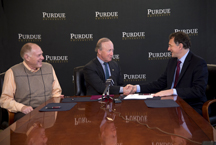Purdue, Houston Methodist partner to take drug discoveries from the 'bench top to the bedside'
March 13, 2014
 |
|
Purdue President Mitch Daniels (center) shakes hands with Mauro Ferrari, the president and CEO of Houston Methodist Research Institute, as Philip Low, Purdue's Ralph C. Corley Distinguished Professor of Chemistry, watches. On Wednesday (March 12) Daniels and Ferrari signed a memorandum of understanding for Purdue and Houston Methodist to collaborate on research and educational initiatives. (Purdue University photo/Mark Simons) |
WEST LAFAYETTE, Ind. - Purdue University and Houston Methodist Research Institute plan to collaborate on research and educational initiatives, including clinical trials of drugs developed at Purdue.
The partnership helps to advance the Purdue Moves drug discovery initiative to translate basic research into life-changing treatments.
"Drug discovery is a top priority at Purdue because of our proven strength in this area and because it is an area in which great breakthroughs will truly change the world," said Purdue President Mitch Daniels. "Purdue has a tremendous basic research capability, but we do not have a medical school. We need partners to translate our discoveries into new medicines and new technologies that save and improve lives. It is a great affirmation of the work done at Purdue that one of the preeminent research hospitals in the world has chosen to partner with us."
Daniels met with Mauro Ferrari, the president and CEO of Houston Methodist Research Institute, on Wednesday (March 12) to sign a memorandum of understanding between the two institutions. Philip Low, Purdue's Ralph C. Corley Distinguished Professor of Chemistry and inaugural director of the Purdue Center for Drug Discovery, also attended the meeting.
Houston Methodist is one of the top clinical trial hospitals in the world and has built infrastructure that quickly brings innovations to the clinic, Low said.
"They know exactly how to bring a drug from the bench top to the bedside and, so, with the strengths that we have at Purdue in discovering new drugs, Houston Methodist makes an ideal partner to really complete the entire journey from discovery to delivery," he said.
The collaboration will make Houston Methodist's infrastructure available to Purdue researchers in the same way it would be available to the institute's own faculty, Ferrari said.
Houston Methodist is focused on the delivery of health care and translating discoveries into solutions in the clinic, and looks for the best possible pipelines of discoveries coming from the academic research world, he said.
It takes 17 years, on average, for a discovery to go from its initial publication in a scientific journal to testing in the clinic. In that time, thousands of lives are lost and more than $1 billion is spent in testing and development, Ferrari said.
"It is necessary that we not only identify great, major scientific breakthroughs, but also the most efficient way to bring those breakthroughs to the clinic and hospitals where those breakthroughs are needed," he said. "I'm very confident that this partnership will bring solutions in areas of health care that will affect our patients, patients throughout the country and patients throughout the world."
Purdue is one of only a few universities in the United States with which Houston Methodist has considered such a partnership, he said.
The partnership is flexible and discussions are ongoing about the details of collaborative initiatives. An educational collaboration is important to both institutions, and Purdue graduate students may have the opportunity to work in the laboratories at Houston Methodist to help take the discoveries through to the point of clinical applications.
"The point of the partnership is to have open communication among researchers and clinicians so that they can learn from each other and work toward the common goal of translating discoveries into new treatments and technologies that benefit mankind," Low said. "It is the first such partnership we have entered into, but we will likely establish similar relationships with one or two other institutions whose expertise aligns with ours in different areas of human health."
Drug discovery is among 10 targeted priorities spelled out in Purdue Moves, an initiative designed to broaden the university's global impact and enhance educational opportunities for its students. All of the moves fall into four broad categories: science, technology, engineering and math (STEM) leadership; world-changing research; transformative education; and affordability and accessibility. Additional information about Purdue Moves is available online at http://www.purdue.edu/purduemoves
The Houston Methodist Research Institute was formed in 2004 to efficiently translate discoveries made in laboratories and clinics into new diagnostic tools and therapies. It receives about $55 million in total extramural funding, including $15.2 million from the NIH. HMRI administers 540,000 square feet of research space used by 1,400 credentialed researchers, and oversees 840 clinical protocols and clinical trials.
Writer: Elizabeth K. Gardner, 765-494-2081, ekgardner@purdue.edu
Media contact at Houston Methodist Research Institute: David Bricker, 832-667-5811, dmbricker@houstonmethodist.org
Sources: Mitch Daniels, president@purdue.edu
Philip Low, 765-494-5273, plow@purdue.edu
Mauro Ferrari, 713-441-7250, mferrari@houstonmethodist.org
Related news release:
Purdue to accelerate drug discovery, development: http://www.purdue.edu/newsroom/releases/2013/Q3/purdue-to-accelerate-drug-discovery-development.html
